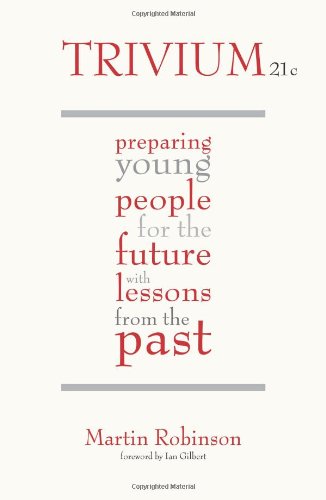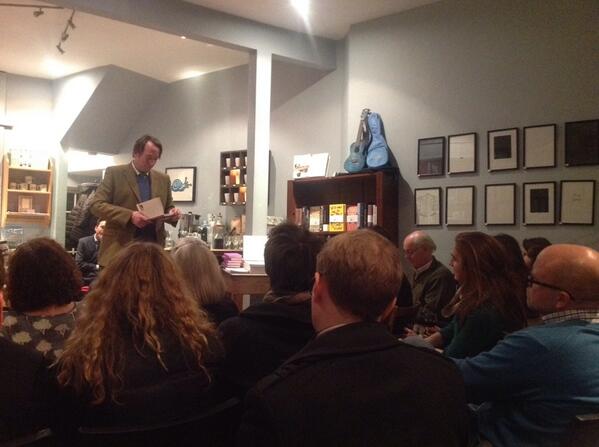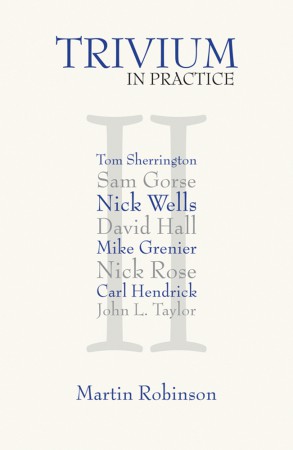
I’ve just finished reading this wonderful book and, as I said on twitter, it’s the best education book I’ve read by far. There are lots of teacher-tips books and plenty of academic system-reform or leadership books – but Trivium 21st C occupies different ground altogether. Martin Robinson has produced a manifesto for reforming and revitalising our educational practice, our discourse and our system based on a set of core principles; ideas about who we are as people: individuals, communities and societies.
The book uses an exploration of the Trivium as it once was – a set of principles for learning that evolved from Plato to the middle ages – as a template for considering a range of contemporary educational problems and debates. Martin uses the story of his daughter as she embarks on her school-based education as a focus point. Through his hopes and dreams for her education, he is able to express the hopes and dreams we all have for our children – and the contrast with what is currently on offer in the mainstream of modern schooling.

Until I read this book, I’d never heard of the trivium. It’s rare to read a book about education that provides this much education itself! But it makes so much sense in our contemporary debate about what education is or could be:
Grammar: The need for a strong knowledge base; the cultural capital that we accrue from vertical transmission; the things that we all must know to function in the modern world.
Dialectic: (with logic and logos built-in) The need to question, debate and discuss ideas; to form our own opinions and to have authentic experiences; to value the processes by which we learn for the way they can help build our character.
Rhetoric: The need to be able to communicate our ideas and knowledge in a variety of forms; to create and perform with confidence and flair.
Martin sums this up beautifully in this passage: The Good Life:

The book is packed with philosophy and philosophers, tracing the development of ideas about knowledge and understanding through history. Building on this, Martin introduces the lovely concept of students as ‘philosopher kids’, taking on the world through the components of the trivium:

The book explores in detail how the components of the trivium have been seen to clash over the course of history and continue to do so in their modern manifestations: traditional vs progressive; knowledge vs skills and so on. However, Martin argues that, reconstituted as Trivium 21st C, there is a way to resolve these tensions to create a model for a modern education that builds on the best of what traditional and progressive approaches offer. This is explored in part through a series of fascinating interviews with a range of politicians, headteachers and policy-makers.
Towards the end of the book, Martin pulls the ideas together to make suggestions for how Trivium 21st C could influence our curriculum and our teaching:

He explores the implications for pedagogy and assessment. This is fascinating. Martin is suggesting that the sequencing of the components – Grammar, Dialectic, Rhetoric- is important and that, therefore, the relevant modes of teaching and assessment need to follow. There is a path to follow over time that teachers should be more conscious of and even use explicitly in their planning and discourse with their classes:

I’m starting to think about the implications of the book for my practice as a teacher and a leader of teachers. Do we place enough emphasis on the firm acquisition of knowledge before we knock it about with dialectic processes? Could we do more direct vertical knowledge transmission with associated assessment practices? Do we engage all our students systematically in the range of dialectic experiences and activities? Are we explicit enough about the role of questioning and of challenge; do we create enough authentic experiences and give enough value to logos… the journey itself. Do we fully exploit our students’ capacity for expression through rhetoric; some come to this more naturally but do we develop the rhetorical arsenal for all of students to the extent that we could?
Trivium 21st C also has questions for our national policy – in terms of the nature of the formal curriculum, accountability processes and public examinations. Do we have a system that will allow a curriculum like the one Martin Robinson describes to come into being beyond a few privileged institutions – or institutions for the privileged?
I’m conscious that the snippets in this post and my ramblings can’t do justice to the book..you just need to buy it and read it. And then act on it. It’s already got me thinking at a deeper level – and that is exciting.
PS: Reading the book on the train to and from work on my iPad Kindle ( the whole book guiltily purchased for £1.89) allowed me to take screen shots to tweet and share with Martin (@surrealanarchy) on Twitter. It’s the first time I’ve had the opportunity to discuss a book with its author during the process of reading it. Thanks to Martin for his enthusiasm for my enthusiasm! The book deserves to be very widely read and discussed. This could be the answer we’re looking for. It’s certainly one of the answers – or part of the answer.
For more insight, please read Mary Myatt’s superb blog about Trivium 21st C: http://marymyatt.com/blog/2013-08-19/not-trivial-martin-robinsons-trivium-21c

UPDATE June 23rd 2016.
Today, Martin’s follow-up book has been published:

I am delighted that Highbury Grove has made a contribution; our story has been captured in Chapter 2. We’re engaging with the ideas in lots of ways – as are the other contributors. It’s well worth a read.

Incredible reflection, thank you.
Sent from my HTC
LikeLike
Reblogged this on The Echo Chamber.
LikeLike
[…] Trivium 21st C: Could this be the answer?. […]
LikeLike
Thought provoking and definitely relevant but much more expensive now…even on Kindle.
LikeLike
Reblogged this on Primary Blogging.
LikeLike
Tom,
This does sound inspiring – I like what the author says about blogging and other ITC modes on his p.115
(horizontal modes versus the vertical – ironically, I have only found this page, as yet, via the amazon look inside version …).
I have just ordered my copy and will talk to you about the ideas here at school! Do consider buying copies for at least the Arts and Humanities’ Subject Leaders here at KEGS, ask them to read it prior to a meeting/set up a voluntary meeting.
All teachers should always reflect on past giants in their subjects and on ancient compared to modern modes of Education. Intellectual history should be the constant focus of all educators – it looks like Trivium … bridges this divide, bringing the 21st century into dialogue with the wisdom of the (s)ages. On this note, your many followers should read again Tom Bennett’s wonderfully sardonic and iconoclastic mockery of those who have believed we should devote our time to equipping people for jobs that don’t yet exist, with no reference to the past, with a vacuous skills only approach – in his Teacher Proof, chapter 9, Buck Rogers and the Twenty-First Century Curriculum.
As one of my other intellectual gurus than yourself would say, “educational thinking in the West at least has been little more than a series of footnotes to the archetypal masters of teaching – Socrates and Jesus” (George Steiner, sort of).We could all do well to re-read these masters, through their literary mediators, Plato and the Gospel writers … Would the aforesaid have got grade 1s for Ofsted related formal lesson observations?!
Excellent to hear a Science teacher like yourself promote a book about the importance (the Primacy?!)of the Liberal Arts! Do enough Science teachers give their students a sense of the philosophy and of the History of Science, to an extent that would help with the implications of Robinson’s opposite-of-trivial vision?
And I am not going off into an old- fashioned two- cultures rant, here.
How can the Vertical (Robinson’s term) be squared with co- construction? ! I am sure it can.
What is for sure is that we teachers of the Liberal Arts have long since been promoting Grammar, Dialectic and Rhetoric – but the Ancient and the Modern must always be held in a dynamic dialogue … standing on the shoulders of giants … but giant leaps from giants’ shoulders ( two buried allusions there …)
David Greenwood
KEGS English Subject Leader
LikeLike
Hi David. Thanks for the comment. I know we haven’t found time for the book club to take root.. but his book is one that must make this happen. I will order some copies this week so more people can read it. A major problem with Kindle books is that they can’t be passed around. I’ll look forward to the discussion – especially keen to hear thoughts about making the ideas in Trivium 21st C find shape in our curriculum and pedagogy at KEGS. Tom
LikeLike
Reblogged this on paddington teaching and learning.
LikeLike
[…] http://headguruteacher.com/2014/01/17/trivium-21st-c-could-this-be-the-answer/ […]
LikeLike
[…] those familiar with Martin Robinson’s fabulous Trivium 21st C (as featured in this review post) I wonder if this approach could be an example of Trivium in action: Grammar (learn the basics very […]
LikeLike
[…] struck me when reading Martin Robinson’s superb Trivium 21st C, that if we’re going to plan a grammar on which our curriculum is based – the core […]
LikeLike
[…] Martin Robinson’s book Trivium 21st Century, he reconciles traditional and progressive ideas in a such a sophisticated manner that people from […]
LikeLike
Thanks for this comment and bringing this book to my attention – where did you get jt for £1.89!! I can only find it for rather more – which as a student …
LikeLike
Thanks for this – very useful for a book I had not heard of – but how did you get it for £1.89! Just asking as a student …
LikeLike
[…] bits I loved and exchanged messages with him on twitter. What a great way to read a book. I wrote a review of the book in this post – and, following subsequent exchanges, arranged to meet Martin during the Easter holidays. […]
LikeLike
[…] travel across KS4 and the Sixth Form and my recent thinking has been influenced significantly by Martin Robinson’s Trivium 21st C. I’ll be bringing all of that thinking with me. I’ve also got ideas about language […]
LikeLike
[…] http://headguruteacher.com/2014/01/17/trivium-21st-c-could-this-be-the-answer/ […]
LikeLike
[…] http://headguruteacher.com/2014/01/17/trivium-21st-c-could-this-be-the-answer/ […]
LikeLike
[…] the idea of using the Trivium 21st C as a basis for a curriculum model – as advocated by Martin Robinson in his wonderful book. We discussed whether it would be possible to seed a staff-led process with the trivium model; […]
LikeLike
[…] in my thinking this year. I got very excited reading it and wrote a blog about it at the time: Trivium 21st C: could this be the answer? I went along to a fab reading at a book shop in Notting Hill – an audience of about 40 that […]
LikeLike
[…] language of the Trivium, as described in Martin Robinson’s book, is very powerful in helping to describe the micro detail of what students learn and how they learn […]
LikeLike
[…] ‘Philosopher Kids’ from Martin Robinson, author Trivium 21stC […]
LikeLike
[…] Trivium 21st C Could this be the Answer […]
LikeLike
[…] works as a description of learning at a more general level. In fact it reads as an expression of the Trivium (with a different […]
LikeLike
[…] Robinson: Martin’s book Trivium 21st C, is still my favourite education book of all time. This year we have the privilege of working […]
LikeLike
[…] also been exploring elements of pedagogy and curriculum planning taking on board ideas from the Trivium and various strands of contemporary educational thinking. With this exploratory work well […]
LikeLike
[…] of our curriculum and our approach to teaching and learning. Hopefully you will recognise the Trivium in this; these ideas are ways of making things happen more deliberately and explicitly so that the […]
LikeLike
[…] The Trivium – parts 1 and 2. The power of Know, Explore, Communicate as a framework for thinking about lessons as well as planning the curriculum. The point is to be deliberate in planning the sequence and relative emphasis of aspects of the curriculum, giving appropriate weight and value to knowledge, hands-on experience and deliberately constructed opportunities for rhetoric. […]
LikeLike
[…] The Trivium – parts 1 and 2. The power of Know, Explore, Communicate as a framework for thinking about lessons as well as planning the curriculum. The point is to be deliberate in planning the sequence and relative emphasis of aspects of the curriculum, giving appropriate weight and value to knowledge, hands-on experience and deliberately constructed opportunities for rhetoric. […]
LikeLike
[…] written a full blog about this book. It remains my favourite book about education. The trivium – grammar, dialectic, rhetoric […]
LikeLike
[…] bullet curriculum reform books, Trivium 21c occupies what headteacher Tom Sherrington described as “different ground altogether.” It stands out as a manifesto for reforming and revitalizing educational practice, our discourse […]
LikeLike
[…] curriculum emphasis on the Trivium is similarly powerful. Working with Trivium 21 wizard Martin Robinson, the staff have bought into […]
LikeLike
[…] significant knowledge. However, having engaged in the debate, read Martin Robinson’s Trivium 21c and Dan Willingham’s work, I’m increasingly convinced that a […]
LikeLike
[…] requiring significant knowledge. However, having engaged in the debate, read Martin Robinson’s Trivium 21c and Dan Willingham’s work, I’m increasingly convinced that a knowledge-rich/focused/led/based […]
LikeLike
[…] is an area I feel needs more attention. It has echoes in Martin Robinson’s Trivium 21c where the dialectic has value alongside grammar. A great curriculum contains knowledge gains […]
LikeLike
[…] course, passing on knowledge is just one part of a more complex process. This is where Martin Robinson’s superb Trivium 21c is so powerful and why is remains one of my touchstones for any curriculum thinking. […]
LikeLike
[…] Trivium 21st C: Could this be the answer? […]
LikeLike